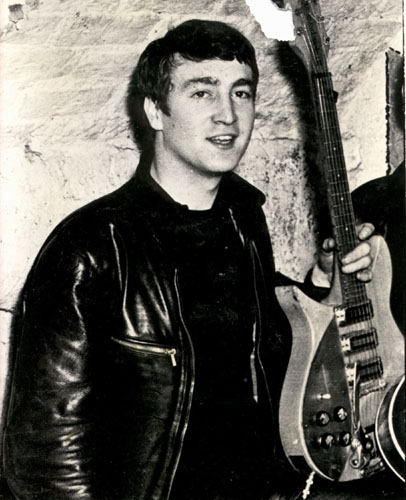
John Lennon’s Biography
“A working class hero is something to be” sang John Lennon on his 1970 solo album, Plastic Ono Band. It was a wonderful sentiment, but working class? Not a chance.
Homes
John was born in Oxford Street Maternity Hospital (Liverpool) on 9 October 1940, and brought home to 9, Newcastle Road (Wavertree) in the Penny Lane area. He was raised from the age of five in his Aunt Mimi Smith’s house at Mendips in Woolton, a middle-class area. It is a common English middle-class custom to name a house, and in this case it refers to a range of hills in the prosperous south of England.
John was determined to leave his mark on Woolton, and engraved his initials on a tree near Mendips. It could safely be stated that Lennon not only left his mark on Liverpool but on the world.
Education
John first attended Mosspits School (Wavertree) before Mimi moved him to Dovedale School (Mossley Hill). At the age of eleven, he transferred to Quarry Bank Grammar School (Allerton) where The Quarrymen were formed. After Quarry Bank School he enrolled in the Liverpool Art College (Liverpool) where he met Cynthia Powell and Stuart Sutcliffe.
Music
The first group he formed was briefly called The Black Jacks before becoming The Quarrymen. The first photograph taken of The Quarrymen is at the Rosebery Street (Dingle) performance in June 1957. Only a few weeks later, he performed at St. Peter’s (Woolton) where he met Paul McCartney. They often practiced at his mother Julia’s house at 1, Blomfield Road (Allerton), and occasionally at Mendips.
John started his musical journey on a guitar which his mother bought for him. Julia taught John to play, but only banjo chords—the instrument she played. The other instrument he became famous for was the harmonica or mouth organ. I always wondered why he chose that instrument. Part of it was because he was given one, though there are various stories about who gave it to him.
Over the years it has been suggested his Uncle George, a student or a bus driver. Either way it doesn’t matter. He used it to great effect on “Love Me Do” and other early Beatles tunes. One possible reason for his interest in the harmonica could be traced to “The Goons”, one of his favourite radio shows. Every show had two musical interludes. One of them was Max Geldray who would play a different song on the harmonica every week accompanied by his band. He was a versatile performer and could play almost anything. It’s quite possible that he inspired a young John Lennon to take to the instrument.
He recalled his childhood in the songs “Strawberry Fields Forever”, “Penny Lane” and his original draft lyrics of “In My Life”. However, one of Lennon’s most famous solo songs was “Working Class Hero”, but was he reflecting on his working class childhood in Liverpool?
When Mimi asked John why he talked like a Scouser when he’d been brought up to speak correctly, he responded: “It’s about money. The fans expect me to talk like this”. Aunt Mimi revealed when she was asked by a publisher to write her memoirs: “Take the money, Mimi”, John told her. “Tell them I was a juvenile delinquent who used to knock down old ladies”.
The two prominent women in his young life were his mum Julia and his Aunt Mimi, who were different individuals. Colin Hanton came to know both of them while he was playing with The Quarrymen. Colin had his own reasons for understanding John’s loss when Julia was killed. “My mum died when I was about ten, and The Quarrymen came to rehearse at my house, and I said,
‘This is my mum’. She was only about ten years older than them—she was my second mum, only about twenty-six. It wasn’t like meeting the other mothers who were quite old. They were shocked. I had lost my mum, like John and Paul did. I remember when I saw John after his mum died and he had his guitar—he always had his guitar with him—and we just stared at each other. I knew what he was thinking, he knew what I was thinking, and we never said anything, and that was it. We never mentioned it again; it’s a man thing—no hugging and stuff”.
Regarding Julia, Hanton recalled, “She was like a big sister, not anything like any mother I’d ever seen. You could go to her house when you should be in school and she wouldn’t mind. I remember once we were at Mendips and John said, ‘I’m going to my mum’s, do you want to come?’ So we walked down to Springwood and we just sat on the settee and she took her banjo out and she showed John some banjo chords. She was like no one I’d ever seen.
“She was different to Aunt Mimi. Oh, Mimi could freeze you to the spot with one stare. I don’t remember going in the kitchen door like Pete does; I went to the front door. We were all Woolton boys, and well brought up—we weren’t scallies. Paul talks about being a ‘scruff from Speke’—he was never a scruff. Even our language was different, it wasn’t that deep guttural language like George or Ringo—we were brought up with good manners and you respected other adults. You were on your best behaviour when you were there, but you just applied what you learnt at home.
“I have mixed memories about us practising at Mendips. Mimi wasn’t one for excess noise. I was there in 2005 and we went to John’s bedroom, and I was asked, ‘Do you remember being in this room?’ and I don’t know why I didn’t say no. I remember John’s bedroom being downstairs in the front room. I remember sitting in there with my back to the coloured, patterned windows and John was facing me and so was Paul. I remember Paul saying to John, ‘Is that where you sleep?’ Behind me in the window was what looked like a long flat thing with a pink cover over it—no headboard. It was disguised as a bench so you wouldn’t know it was a bed. I reckon that with all of those lodgers there, Mimi was sleeping downstairs in the back room and John was sleeping in the front room. I must have had my drums there with John and Paul but it was one of the rare occasions.
“Because Mimi’s lodgers were medical students, one of them taught us a filthy alphabet: A is for arsehole, B is for bastard…….. etc. right through the alphabet. It was absolutely disgusting, but a medical mind could remember it all. I told this recently and Pete Shotton said ‘Oh yes, I’d forgotten about that’.
“I heard a story recently that Mimi was sleeping with one of the lodgers—one of the vets told his story and he admitted he had slept with her: it has destroyed my image of Mimi”.
Alf Lennon
When it comes to the parents of The Beatles, none have been so controversial or discussed as John’s mum and dad. The reasons are numerous. Alf and Julia split up when John was young, but Alf came back into his life in the sixties in a public way, appearing in the newspapers and releasing a single called “It’s My Life”. He and John played out their relationship publicly for a while.
Was Alfred Lennon a rogue? Most of the early books were written with Mimi Smith as the main source of information, even having some editorial control. It wasn’t in her interest to paint Alfred in a good light or Julia in too bad a light. Julia didn’t meet any of Alf’s family until after John was born, when she met his mother. Alf would occasionally meet Julia at her home in Berkley Street, but on one occasion, Pop Stanley demanded that Alf leave his daughter alone.
Pauline Lennon, who married Alfred in the sixties, has published a book, Daddy Come Home, which is based on the manuscript that Alf wrote to be passed on to John. When John read it after Alf had died, he realised that he had not known the whole story about his mum and dad. The following is a synopsis of the various accounts of Alf and Julia’s life, according to Alf Lennon’s memoirs.
Alf’s life had started at 57, Copperfield Street in The Dingle in 1912. Alf’s mum, Mary, known as Polly, was his father Jack’s second wife. She brought up the six children. However, when Jack—who was older than her—died, she couldn’t afford to bring up all six children, so she accepted the offer of two places for her eldest children—including Alf—at the Bluecoat School in the Penny Lane area of Liverpool. It was an orphanage, and offered a great education. And so, at the age of seven, Alf left home for the Bluecoat. He suffered badly from rickets, which gave him weak legs, and he didn’t grow as tall as he should have, reaching just 5-feet-4-inches.
Alf (or ‘Freddie’ as he was often called) befriended Jackie Bond, who became a teacher at Quarry Bank School. He later taught Alf’s son, John. Alf was interested in the sea, and joined the Merchant Navy when he came of age. Shortly before his first voyage, he met a young girl in Sefton Park named Julia Stanley. They hit it off. He was sixteen and she was a year younger. Julia had beautiful long red hair, and a gorgeous figure.
Her only fault was poor eyesight, something she would pass on to John. Alf’s first voyage was on the SS Montrose which was owned by the Cunard Shipping Line. While away he thought constantly of Julia, and couldn’t wait to see her again. He visited the Stanley’s family home in Berkley Street, but tensions grew when Pop Stanley told him to stay away from his precious daughter.
This only served to push Julia into Alf’s arms and so they decided to get married. They exchanged vows in the Mount Pleasant Registry office (where John and Cynthia were married) and crossed the street and entered the Big House pub for a meal and drinks supplied by his brother Sydney. Julia jokingly listed her occupation on the marriage certificate as ‘Cinema Usherette’ because of her love of the movies. Their ‘honeymoon’, of sorts, was in the Forum Cinema on Lime Street. They then went home to their separate houses.
Alf had made an honest woman of Julia and so Pop Stanley agreed to help them. On return from his latest trip, Julia met him at the ship and took him to 9, Newcastle Road—their new home, which they shared with Julia’s parents. Pop and Anne Stanley greeted him warmly, much to his surprise.
Away at sea on the Empress of Canada when John was born, Alf didn’t see him for a few weeks. His frequent trips to sea started a rift between Julia and Alf. Julia commented that Alf was married to the sea. It wasn’t an exaggeration. Between 1 August 1940 and 13 January 1944, he spent three months at home in total. Julia was fed up and told Alf it was a choice between her and the sea: the sea won. This could be considered unfair of Julia since this was in the middle of World War II and every man had to do his duty.
The rank of Saloon Steward on the Moreton Bay was gained, which showed he had good prospects. Even Pop and Mimi were impressed—maybe they could make a decent man out of him yet. After John was born, Julia and Alf moved with their son to the Dairy Cottage in Woolton. While he was home, Alf was a firewatcher for the war effort. Even when he was on leave, he wasn’t in the house much.
Alf then set off on the SS Berengaria and promised everything would be better when the war was over, and he would be home soon. The Berengaria was bound for New York. Alf had been promoted to Chief Steward and Mimi was even more impressed. Alf, Julia and Mimi celebrated before he set sail for New York, a city he dearly loved. However, it was eighteen months before Alf and Julia saw each other again. Alf constantly entertained people whether on the ships or in the bars of New York. He sang songs and did a hilarious send-up of Adolf Hitler, which was his party piece and something that John performed as well.
For the return voyage, Alf was offered a ship, not as Chief Steward but as assistant. Since he did not want to lose his higher rating, his options were to wait until he returned home and complain—which could take months—or miss his ship, which was risky. He decided to miss his ship with dire consequences. He went the next day to the British Consul to explain, but when he arrived there he was arrested and held in Ellis Island for two miserable weeks. By this time, he had already been away for months, and there had been no contact with Julia, nor had he sent her any money. Finally, he was ordered to take a position on the Sammex, which was bound for the Far East, carrying whisky and cigarettes. Alf soon discovered that the voyage was not altogether legal, and when they reached Bone, in North Africa, military policemen boarded the ship and everyone was arrested and sentenced to three months in an army prison. Alf went to the Consul and he was permitted to board the Monarch of Bermuda as a Distressed British Seaman. By the time Alf made it back home, he had been away for eighteen months, and Julia suspected he might be dead.
Alf returned to sea at the end of 1945, and didn’t come back until March of the next year. When he arrived at the house, he found Julia outside talking to a man. He went inside to be greeted by Pop Stanley, whose tone of voice was completely different, and Julia walked in with John ‘Bobby’ Dykins. Alf had to report for another voyage, but on his return, he went straight to Mimi’s house, as John was now living there. Mimi told him how Julia and John Dykins were ‘living in sin’ at Newcastle Road, and added that she was disgusted with her.
Alf took his son—after giving Mimi the £20 she asked for to cover expenses for John—to his friend’s house in Blackpool. It was there that Alf discussed his plan to emigrate with John to New Zealand.
They had been living in Blackpool for a short time, when on 22 June 1946, Julia turned up at the house. She had found them by contacting the Merchant Navy Pool. A heated discussion over custody ensued and they agreed to let their child make an adult decision. The two turned to John and unfairly asked him what he wanted to do. John sat on his dad’s knee, and Julia realised the decision was made. As she walked away, John let go of his dad and ran after her with those haunting words he later reproduced in the song “Mother”: “Momma don’t go; Daddy come home”. John wanted to live with both of his parents in peace and harmony. Unfortunately, that was not an option.
Julia returned to Liverpool with John in tow and returned him to Mimi at Mendips. Heartbroken, Alf considered emigrating, and nearly did, but at the last moment changed his mind.
After getting into a fight in London, Alf spent four months in prison. When he returned home to Copperfield Street, he was greeted by his brother Charlie with the news that they had been trying to reach him. Two months previously his mum had died. Alf was distraught. The Merchant Navy wouldn’t take him on again, and he had no job, no home and no money. He eventually washed dishes for a living.
Julia was killed on Menlove Avenue in July 1958, but again Alf didn’t know. He only found out later when his brother Charlie sent him a newspaper clipping with the news about the accident.
When John first became famous, Alf didn’t pay much attention. However, people started to recognize him, so he kept moving jobs. Eventually stories appeared in the press, but giving Mimi’s version of John’s life, and Alf was convinced by a reporter at The Sketch newspaper to discuss the story. They arranged a meeting with John in London. Alf went to see him, first seeing Brian Epstein, and then Paul, George and Ringo in the hallway.
John and he talked for a while and Alf convinced him he didn’t want to cash in on his son’s fame. They laughed and joked for a time.
He later had a change of heart and sold his story to the magazine, TitBits. Alf was approached by fellow Liverpudlian Tony Cartwright who was managing an up-and coming Welsh singer named Tom Jones. Tony convinced Alf to make a record called “It’s My Life”, which was sold around the world. However, it disappeared overnight in the United Kingdom. It was suggested that Brian Epstein was responsible for putting pressure on the record companies and shops to withdraw the record from sale, as John was horrified when he discovered that Alf was making a record. Alf and Tony went to John’s house, but John told him forcefully to leave. Alf gave up his brief recording career and returned to his unremarkable life.
After John’s trip to see the Maharishi Mahesh Yogi in London in the summer of 1967, John began meditating. The first step to discipleship, according to the Maharishi’s teaching, is to forgive your parents. At the same time, Uncle Charlie wrote to John and told him blankly what had happened, and not to believe everything Mimi told him. John discovered that Julia had been pregnant with another man’s child, and confronted Mimi with this information. Naturally, the subject matter was not up for conversation.
Six days after Brian Epstein died, John wrote to Alf out of the blue. He started his letter with “Dear Alf, Fred, dad, Pater whatever”, and wrote “there’s hope for us yet”. He finished the letter by telling Alf not to say anything to the press because he didn’t want Mimi ‘cracking up’. Interestingly, John signed off all of his subsequent letters with the phrase ‘write if you feel like,’ a classic sign of being insecure and fearing rejection.
John later sent official Beatles biographer Hunter Davies to meet Alf to get his father’s side of the story of his childhood. Alf was delighted to share the truth with Davies. However, when the book eventually came out, Alf was dismayed to see that his side had been left out. John later admitted that he had allowed Mimi to check the manuscript first. John and Alf met up once again, and John asked his father to live with him, Cynthia and Julian. This worked within reason, but John was never home and Alf was soon bored. It was decided that he should move into a flat of his own. John set him up and gave him an allowance of £10 a week, through Peter Brown at Apple.
Then things changed dramatically. Alf met nineteen-year-old Pauline Jones, and against her family’s wishes, she agreed to marry Alf in the summer of 1968. Alf was fifty-four, a good thirty-five years her senior. John was pleased for them and even took Pauline on as a secretary and to help Cynthia with Julian. John also paid for their flat in Brighton, and soon she was pregnant again after a previous miscarriage. They had a son called David. Not wanting to miss out on fatherhood a second time, Alf became a house-husband while Pauline went to work (exactly as John would later do for his second son, Sean).
John started Primal Scream Therapy in 1970 and his years of pent up anger and the bitterness of his childhood came to the forefront. The trauma of being asked to choose between his mum and his dad came back to him, and broke him. Once again, this led to anger and resentment against his father. On John’s thirtieth birthday, Alf, Pauline and David were invited for a visit. When the family arrived, John screamed at his father for ruining his life and for abandoning him. John finished his vitriolic rant by telling Alf that he wished he were dead. Alf panicked and left with Pauline and David in tow. Soon after, John had them thrown out of the Brighton flat, and they set up home in a little cottage in Blisworth, near Brighton and didn’t see or hear from John for five years. Pauline became pregnant again and gave birth to Robin in October 1973.
Alf, Pauline, David and Robin shared a peaceful existence until Alf was diagnosed with terminal stomach cancer. When Alf was admitted into hospital, he knew it was the end. Pauline contacted John through the Apple offices. It seemed that John had tried to find them, but without success. John sent a massive bouquet of flowers to Alf’s room and telephoned him. The two shared a laugh and John promised to get together when Alf was discharged from hospital (John didn’t know how ill Alf was). They parted with a typical Scouse phrase—’see you la’. According to Pauline, Alf was remarkably changed after that phone call—he had reconciled with his son. Alf passed away shortly afterwards on 1 April 1976. John sent a wreath but he did not attend the funeral as he could not leave the U.S. at the time because of his long-running immigration case.
Pauline promised Alf that she would send John a copy of his autobiography. The book had not been published, but Alf was more concerned that John should read it. John was so grateful to Alf for putting pen to paper that he determined to do the same for his first son, Julian, and he started keeping a journal in 1975 and did so right up to his death.
David Bedford
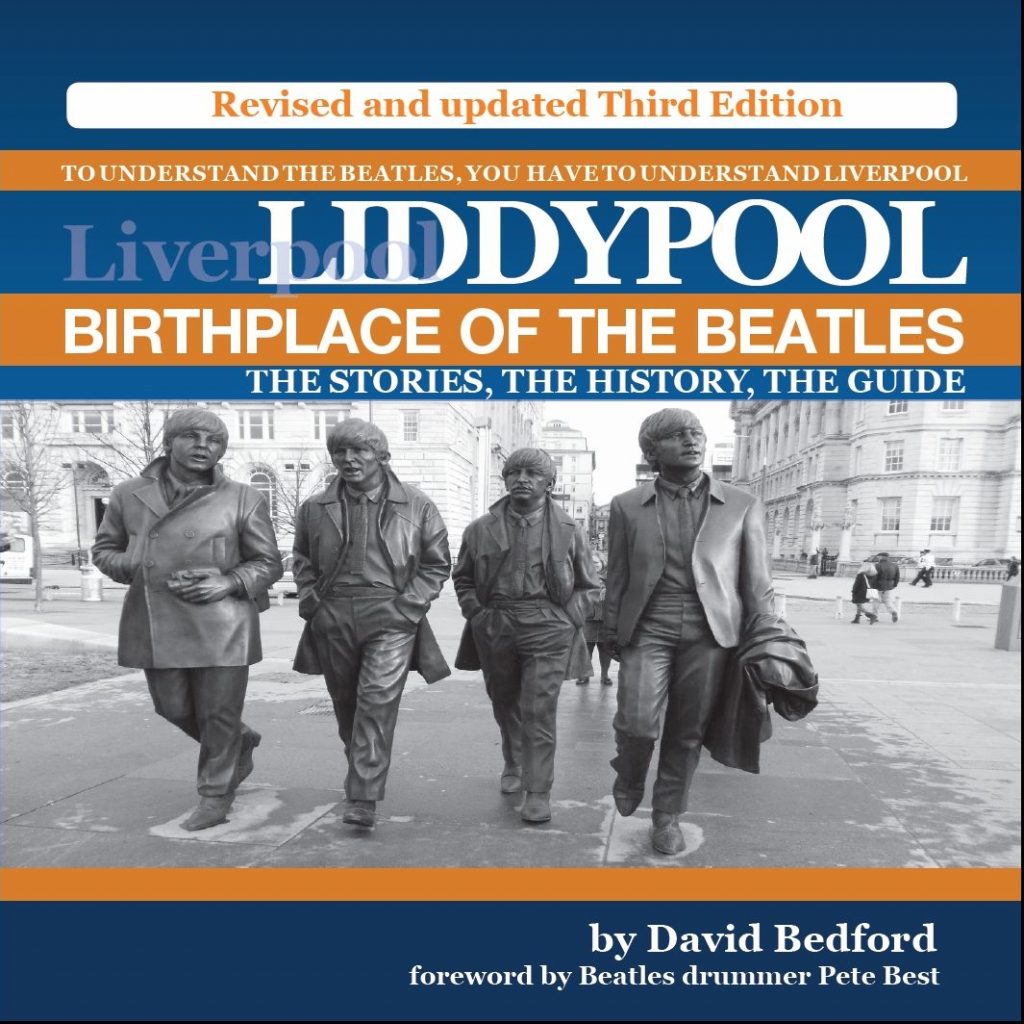


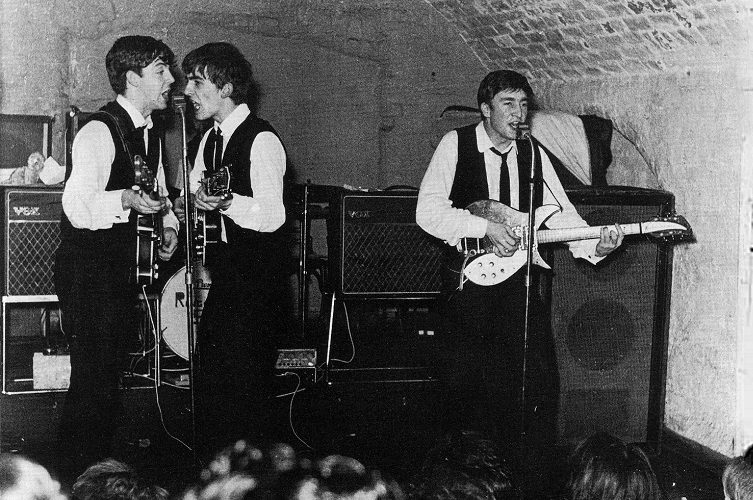

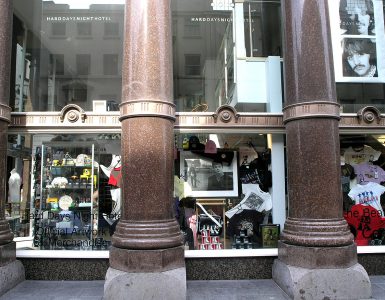
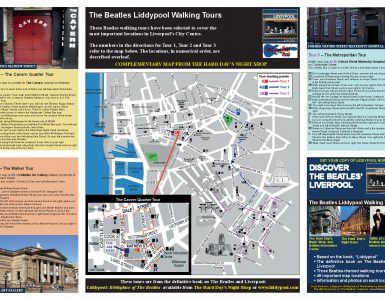
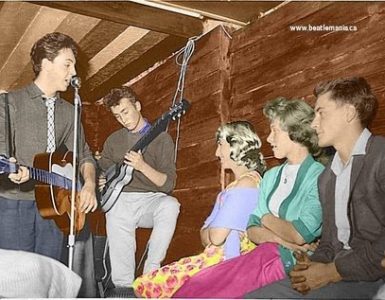









[…] John Lennon: Alf Lennon & Julia Lennon; John Dykins, Julia and Jackie […]